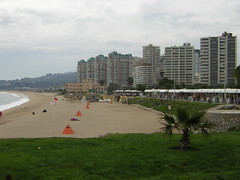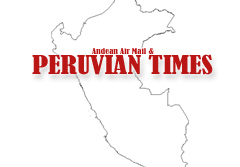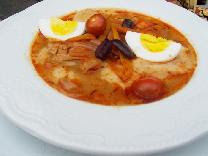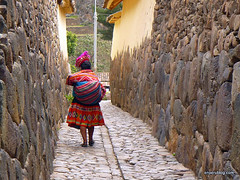Starting life as a rocky bay that was the nearest natural port to Pizarro’s capital of Los Reyes, El Callao soon became the most important port in the Spanish colonies. It has witnessed colonial splendour, pirate attacks, disastrous tsunamis, battles, republican splendour and economic collapse. Each of these events have left a mark on the city and the chalacos that live there, many of these marks visible to this day.
Category: "Lima City Guide"
Huaca San Borja
It was not as important or majestic as the other huacas that once stood nearby, specifically those of the grand Limatambo not far away, but at least it breaks the mould of the modern district of San Borja, a district only a little more than 30 years old, built over the farm land that once surrounded this, the Huaca San Borja.
Lost city of Cerro Azul
When the Incas arrived in the Cañete valley they found it fiercely defended by the Guarco (Huarco) people who lived there. It took future emperor Túpac Yupanqui years to subdue them, even going as far as to temporarily recreate the imperial capital of Cusco nearby as a base to attack from, moving the empire’s army there in the process. There were Huarco fortresses dotted across the fertile valley, and these fiercely defensive people had 20,000 warriors at their disposal, reading to die for their freedom – but life for the Huarco wasn’t always like this.
Real Felipe Fortress
The Fortaleza del Real Felipe is the most prominent landmark in Callao. Built during colonial times, it was used to defend Spain’s most important port in the Americas against pirates and corsairs who would otherwise raid Callao or nearby Lima as they did up and down the Pacific coast. Today it is a tourist attraction and museum run by Peru’s army.
Limatambo and the Huacas Santa Catalina & Balconcillo
Between the two neighbouring administrative areas of Maranga and Sulcovilca was Limatambo. Once a busy town surrounded by fields, only two structures still exist on the edge of San Isidro and in La Victoria.
Mercado de Magdalena
A short photo-tour of the local market located on Plaza Túpac Amaru in the district of Magdalena del Mar.
Eating in Lima – What not to miss – Desserts
Part six of what not to miss when eating in Lima.
To say that Peruvians have a sweet-tooth is like saying that fish enjoy being in water. It’s plainly clear and a huge understatement! In fact, Peru is one of only two countries in the world for which Coca Cola was forced to change its traditional recipe in order to make any inroads into the market – they had to make the formula sweeter. Many different desserts are enjoyed across the country and many of them are found in Lima, many of them also originating in Lima.
The Shipibos of the River Rimac
They used to live and the edge of an Amazonian river that was an unending source of life. But they came to Lima, and now they live on river that is a polluted source of illness and death. Far from their lands, their children no longer speak Shipibo and their customs are almost forgotten.
8 Reasons Why Lima is More Than a Layover [Featured]
It was on the floor of a Barnes & Noble in American suburbia when I first opened a guidebook to Peru. I was being sent to Lima for an internship program so, with bubbling excitement, I set to work dissecting every travel guide I could find.
You can imagine my discomfort when, upon flipping to page 64, I was greeted by an opening line that read something like, “Lima is the ugliest, darkest, most depressing city on Earth.”
On the UFO trail in Chilca, Peru
Tonight I will have to see to believe. I will submit without prejudice to what is presumed will be an incomparable experience and to forget, even for a few hours, that shameful fear of the unknown that I was caught up in as a child and even now I have not lost.
The route has taken us just 67 kilometres south of Lima on the afternoon of March 30, in the desert Chilca the cloudless sky is painted entirely red. Sixto Paz, the man who claims to have had his first extraterrestrial contact 35 years ago and having visited Ganymede (one of Jupiter’s moons), heads the group of 40 people, including journalists from Costa Rica, United States and Peru, members of Rama, a curious group, and Ana Maria Polo, the famous judge of the virulent “Caso Cerrado”, who tries to make her secret passion for the expedition go unnoticed.
Huaca Huantille
The Huaca Huantille was one of countless archaeological sites lost among the urban sprawl of Lima, forgotten and neglected. That was until Francis Allison, mayor of the district of Magdalena del Mar where the pyramidal structure is located, decided to try to restore it along with the run down neighbourhood it is located in.
Lima city districts at war over boundaries
One thing you can say about living in Peru is that there’s never dull moment. Things happen here that just don’t happen elsewhere… like Lima city districts fighting for control of territory and tax payers.
Believe it or not, this involves clashes between each district’s auxiliary police and residents trying to gain footholds in disputed territories with their security posts, and mayors accusing each other of threatening behaviour. We can only hope things don’t escalate to having standing armies invading neighbouring districts in bloody imperial conquest.









